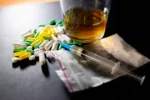
What Does a Heroin Addiction Look Like?
Within the brain are numerous receptors that allow us to experience the world around us and learn from said experiences – certain stimulants, like a hot stove, send negative signals to the brain, whereas other stimulants, like eating a high-quality meal, send positive signals. Our biological makeup steers us towards those stimulants offering positive signals.
Unfortunately, certain substances send positive signals to the brain due to their effects on the pleasure receptors, even though the use of these substances has significantly negative impacts.
Heroin use is one such example of a pleasurable or euphoric signal that has drastically negative effects on one’s physical and mental well-being.
What is heroin?
Heroin is a semi-synthetic opioid drug. It is made in laboratories from morphine, a naturally occurring chemical found in opium poppy plants. When used, heroin interacts with the opioid receptors in the brain, causing feelings of pleasure, contentment, relaxation and/or euphoria.
These effects can be highly addictive for various reasons, including the way they numb or dull any symptoms one might be experiencing from physical illnesses or mental health complications (i.e. heroin may dull a frantic state of mind caused by anxiety, or severe discomfort caused by physical injury).
Individuals who have been prescribed opioid pain medications to help with certain conditions are at a higher risk of developing a heroin addiction due to their familiarity with these effects.
What causes a heroin addiction?
There is no one cause of a heroin addiction, as each person’s history and experiences play a role in whether or not an addiction develops. Some people may use heroin once and never develop any kind of symptoms of addiction, while others may begin actively seeking heroin use after that singular introduction.
However, a number of risk factors are usually present when the signs of addiction begin to show.
Potential causes of a heroin addiction include:
- Genetics – Studies show that some genes are more susceptible to developing an addiction than others
- A history of addiction in one’s family – If close members of your family struggle with addiction, your risk of developing an addiction is higher
- A history of mental illness – Anxiety, depression, PTSD and OCD, to name a few, can play a role in a developing addiction
- Environment – Your peers and the situations you find yourself in play a role in whether or not heroin use occurs
- Opioid prescriptions – Those who have been prescribed opioids for certain medical reasons are more likely to use heroin than those who have never used opioids
It is important to take these causes with a certain understanding that just because these factors may be present in someone’s life, they are not guaranteed to develop into a heroin addiction. While some who struggle with depression may also struggle with substance abuse, others with depression may never seek to cope with those emotions in that way.
The symptoms of heroin addiction
As one’s use of heroin continues, certain signs will begin manifesting, clueing loved ones into the reality that a problem is, unfortunately, present. Alternatively, you may notice signs in your own life that an addiction may be developing, giving you the boost needed to seek treatment.
Signs of heroin addiction include:
- Needing to take higher doses of the drug in order to feel the same effects
- Experiencing withdrawal symptoms (muscle pain, GI distress, sleep problems) whenever you try to stop taking the drug or when a dose is missed
- Spending an excessive amount of time thinking about using substances or recovering from the last use
- Sudden weight loss/gain
- Changes in eating or sleeping routines
- Inability to keep a job, or missing school/work/family obligations
- Struggling financially
- Patterns of dishonesty
- Withdrawal from previously enjoyed hobbies, activities or social situations
- Withdrawing from one’s family and friends
- Periods of depression, or, on the contrary, periods of hyperactivity
If you recognize these signs in your own life, or in the life of a loved one, it may be time to seek help.
What are the dangers of heroin addiction?
Every addiction to any substance has a long list of harmful side effects the user is going to experience. Heroin is no different.
Because heroin is rarely distributed in pure form – it is often cut (mixed) with other substances like sugar, milk powder and even fentanyl to extend a batch – a number of complications can come from injecting these substances into the bloodstream including blood clots.
Additional negative effects of heroin addiction include:
- Liver, kidney and heart problems
- Changes in brain chemistry
- Dental issues
- Constipation and stomach cramps
- Collapsed veins
- Higher risk of pneumonia
- Reproductive issues in both men and women
- An increased risk of mental health problems
Long-term heroin use significantly impacts one’s life in a way that is, sometimes, irreversible. In order to avoid these negative, long-term effects, it’s important to seek the right form of treatment to help address the motives behind the addiction and begin reshaping healthy habits in your life.
Recovery from heroin addiction
Thankfully, recovering from a heroin addiction, though difficult, is entirely possible. With the right personalized treatment plan, and determination to get better, recovery is within reach.
To learn more about heroin addiction recovery, contact us at Bluff Augusta by calling [phone_linked] today.








